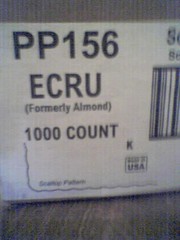The Philosophy of Fun with Danish
So on today's episode of _Scrubs_, JD's brother is in mourning and confines himself to the bathtub with a mountain of beer for days on end. (By the way, while this might be a good way to deal with grief, it's also great way just to blow the weekend.) Anyway, at one point JD comes to talk to him and the brother starts looking for his beer by sipping off all the cans floating around him. Sip, "Nope, bathwater." Sip, "Nope, backwash." The translator translated this as "body shampoo."
Now here's where things get a little poststructural. The phrase for "body shampoo" in Danish is actually "body shampoo," written in English. I mean, the translator actually wrote "body shampoo" in English as the incorrect "translation" for another phrase _in English_. And while that's Derridean enough to send me spinning for a few minutes, consider that anybody who speaks English is probably going to catch the mistranslation, whereas anybody watching who doesn't speak English would have the same level of incomprehension whether the word is translated incorrectly or whether the translator had just gone ahead and written "backwash" in English. Either way, they don't understand, the only difference being that in the "body shampoo" translation, they think they've actually seen the correct translation and are laughing at the wrong "joke." And this miscomprehension is based on the fact that the Danes are using the English phrase "body shampoo" to represent a conceptual space within the Danish language in a way that it has effectively been naturalized as the correct Danish phrase, as opposed to "back wash," which is evidently what the translator thought was being said, though to my knowledge nobody ever says "back wash" to mean "body shampoo" in English. Something about this is boggling my mind.
Now here's where things get a little poststructural. The phrase for "body shampoo" in Danish is actually "body shampoo," written in English. I mean, the translator actually wrote "body shampoo" in English as the incorrect "translation" for another phrase _in English_. And while that's Derridean enough to send me spinning for a few minutes, consider that anybody who speaks English is probably going to catch the mistranslation, whereas anybody watching who doesn't speak English would have the same level of incomprehension whether the word is translated incorrectly or whether the translator had just gone ahead and written "backwash" in English. Either way, they don't understand, the only difference being that in the "body shampoo" translation, they think they've actually seen the correct translation and are laughing at the wrong "joke." And this miscomprehension is based on the fact that the Danes are using the English phrase "body shampoo" to represent a conceptual space within the Danish language in a way that it has effectively been naturalized as the correct Danish phrase, as opposed to "back wash," which is evidently what the translator thought was being said, though to my knowledge nobody ever says "back wash" to mean "body shampoo" in English. Something about this is boggling my mind.





